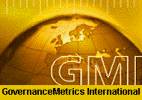GMI Announces New Country Rankings for Corporate Governance
Ireland, UK and Canada Lead the Way; China, Mexico and Chile Lag Behind
Published 09-23-09
Submitted by GovernanceMetrics International (GMI)
GovernanceMetrics International (GMI), the corporate governance research and ratings firm, announced today new country rankings based on overall quality of corporate governance.
GMI publishes research and ratings for 4,207 companies in 45 countries. Out of this global universe the highest ranked markets were Ireland, with an average overall company rating of 7.44, followed by the UK (7.36), Canada (7.35), Australia (7.32) and the US (7.18).
GMI ratings are scaled from 1.0 to 10.0, with 10.0 being the highest. The new country rankings were based on GMI’s most recent company ratings, which were made available to clients yesterday.
565 of the companies covered by GMI are from emerging markets. South Africa ranked the highest among this emerging market peer group, with an average overall rating of 6.49. The average overall rating for all emerging market companies covered by GMI was 4.09.
Singapore's average rating of 5.07 ranked number one among the Asian markets covered by GMI.
Within the Latin America region, Brazilian companies ranked the highest, with an average overall rating of 4.01.
The lowest ranked countries worldwide included China (3.01), Mexico (2.48) and Chile (1.96). China’s ranking was particularly striking in light of its rapid growth in recent years and is largely due to 82% of companies covered by GMI having a non-independent board, 60% having an executive chairman with none of the 40% non-executive chairmen classified as independent by GMI, and disclosure levels that are still well below standard.
Other notable results included Japan, the world's second largest economy but with a low average rating of 3.32. Reasons for this include the fact that 96% of Japanese companies rated by GMI have a majority of non-independent directors on their boards, 45% have no independent directors at all and 30% comprise executive directors only. GMI also found some remaining problems with cross-shareholdings (5%) and a sizable proportion of companies with poison pills (30%).
The average rating for Israel was only 3.88, largely due to non-independent boards, with only one of the 16 companies rated by GMI having an independent Chairman (most are nominated by the majority owner or an executive). Disclosure is also below standard, particularly on remuneration issues. Israel’s low ranking struck GMI as noteworthy since index compiler MSCI Barra announced earlier this year that Israel would be moving from emerging market to developed market status in 2010.
GMI also looked at the average number of red flags assigned to companies in each market. GMI uses red flags to highlight particularly problematic governance developments that have the potential to impair valuation. These include: accounting irregularities, significant related-party transactions, limitations concerning shareholder rights, significant litigation and criminal investigations, among other things.
The country with the highest ratio of red flags was Turkey, with an average of 2.73 per company. Russia and China were next, with an average of 2.08 and 2.05, respectively, followed by Chile (1.83) and Hong Kong (1.78).
UK companies fared the best in this analysis with an average of only 0.27 flags per company. The average for all companies covered by GMI worldwide was 1.0 flag per company.
GMI’s new country rankings are available here.
According to GMI President and CEO Howard Sherman, "Many of the country rankings come as no surprise, as our research and ratings place a great deal of emphasis on transparency and accountability. But a low ranking today also spells opportunity. As emerging markets in particular compete for global capital and develop a cross-border shareholder base, it seems inevitable they will face pressure to become more transparent and less insular. South Africa serves as good example here. Its average rating of 6.49 was the highest among all of the emerging markets we cover and higher than many developed markets. We think that translates into a competitive advantage for the South African economy."
"Still, country rankings are only a guide," Sherman added. "Within each country there are companies with relatively strong or improving governance and those with relatively weak profiles. That is where we and our clients concentrate our research efforts and where the real investment opportunity, or risk, is usually found."
About GMI: GMI ratings, research reports and e-Alerts are used by a wide array of global financial institutions. Depending on the organization, clients use GMI as part of their overall investment research strategy, to support corporate engagement programs and ESG-specific research and investment products, and to help assist with portfolio risk analysis. GMI is often combined with traditional analytical tools such as discounted cash flow or financial ratio analysis to create more robust valuation models. GMI publishes new research reports for all companies covered on a quarterly basis and conducts interim re-ratings when events so warrant. Additional information can be found at www.gmiratings.com.

GovernanceMetrics International (GMI)
GovernanceMetrics International (GMI)
GMI is an independent governance research and ratings agency, assessing the governance practices of 4,200 companies globally.
More from GovernanceMetrics International (GMI)

